The post “It was the happiest day of my life, when I took my boy back” – Ivan* and Stoyan’s* story appeared first on Hope and Homes for Children.
]]>Stoyan* will never forget the night Ivan*, his three-year-old son, was taken from him.
“A policeman came to the door and entered my home without asking and just took him. No warning, no support”, he remembers. “It was terrible.”
Ivan had cerebral palsy, and the authorities decided Stoyan, a single dad on low income, wasn’t fit to care for him. As a result, Ivan spent two years inside an orphanage. Lonely. Afraid. Until people like you brought him safely back to family.

Hope and Homes for Children
The pain of separation
Overnight, Stoyan’s life changed forever. After his wife left, he’d worked night and day to care for their son. But now, everything was ripped away.
“It was horrible”, Stoyan remembers. “I’m a labourer and I was working 12 to 15 hours a day because I couldn’t sleep. My friend told me, ‘If you carry on like this, you’ll kill yourself.’ I was waking up in the night and crying because Ivan wasn’t with me.”
“I was waking up in the night and crying because Ivan wasn’t with me.”
Sadly, Ivan was suffering too.
Inside the orphanage
Ivan spent the next two years heavily medicated. Confined to a cot in a darkened room on the top floor of the orphanage, he’d wait for his dad to visit.
“The institution would allow me to visit only once a week for 15 minutes, between 1030 and 1130 when Ivan was tired and hungry”, Stoyan remembers. And worse, every time he came, he saw his boy’s condition getting worse.
“How was the care? Total zero care,” he recalls. “They tied him into a wheelchair. Before then, Ivan was beginning to stand and walk with support and he had started to speak. He could say mummy and daddy.”
“They tied him to a wheelchair.”
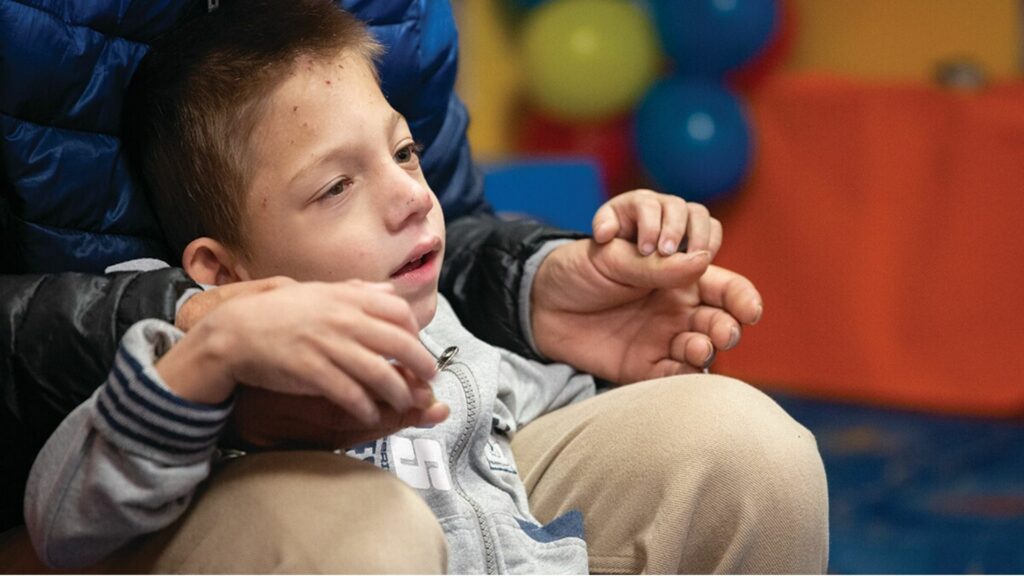
Hope and Homes for Children
For two years, Stoyan fought a lonely battle against red-tape, prejudice and indifference. The odds were stacked against him.
“First, if I take my boy home, the institution loses income”, he explains. “Then, even when I went to court and won full custody of my son, the institution just ignored it.”
Ivan was stuck.
Family first
Ivan’s experience is all too common. Around the world, 80% of the 5.4 million children in orphanages have living parents. And one in three children in orphanages have disabilities.
One in three children in orphanages have disabilities.
European Disability Forum
The one-size-fits-all model of institutional care doesn’t help children. It harms them. Above all, children need love, care and personal attention. Something even the “best” orphanages can’t provide.
Stoyan knew he had to get his boy home. And thanks to your generosity, he found the help he needed.
The fight begins for Stoyan
Since 2011, our team in Bulgaria has been working to close orphanages and bring children living inside back to family. Children like Ivan.
Elitsa Ivanova, one of our support workers, discovered Ivan’s case, and immediately started working to help Stoyan.

“The local child protection department lied to him,” Elitsa remembers. “They kept setting him tasks and challenges but when he met them, each time the authorities let him down again. Because he is a man on his own, people could not see him as the parent for a child with a disability.”
“Because he is a man on his own, people could not see him as the parent for a child with a disability.
Elitsa knew that Stoyan was a loving father. She knew all he needed was some help. And thanks to your support, that’s what he finally received. Help.
Helping Stoyan change the tide
Your donations helped Stoyan convince the authorities he was the best option for Ivan. They helped him find a better place to live, as well as all the essentials he needed to support Ivan and his disabilities.
With your help, and Elitsa’s team by his side, Stoyan brought Ivan back to family.
“It was the happiest day of my life, when I took my boy back,” Stoyan remembers. “Now, we like to do everything together. He is very affectionate, he hugs and kisses me. He likes my stubbly chin so I don’t shave for him!”
Read more about how your donations help parents bring their children back to family.

Hope and Homes for Children
Looking to the future
Today, Ivan’s doing much better. Stoyan says he has seen a rapid improvement since Ivan stopped taking the drugs that were prescribed by the institution. Now, he can stand and walk by himself, and is slowly learning to speak again.
When we asked Stoyan about the challenges he faces, he told us simply, “There are no challenges now. I just love my boy and I am not interested in anything else.”
“There are no challenges now. I just love my boy and I am not interested in anything else.”

Hope and Homes for Children
Thank you
Thanks to your continued support, our team was able to support more children like Ivan – standing up for their right to a loving, family home. Today, the orphanage has been shut down. And that’s all thanks to your help.
Want to hear more incredible stories about the impact of your donations? Sign up to our Mailing List and receive more heartwarming and inspiring examples of children finding their way back to family.
Join the Mailing List
SUPPORT OUR WORK We need your help
Your donation will help us bring more children like Ivan back to family.
The post “It was the happiest day of my life, when I took my boy back” – Ivan* and Stoyan’s* story appeared first on Hope and Homes for Children.
]]>The post 3 incredible stories of love from parents worldwide appeared first on Hope and Homes for Children.
]]>All too often, interconnecting factors like poverty, access to healthcare and education, and a misrepresentation of the orphanage system mean parents are unnecessarily separated from the children they love. Today, and every day, we support parents and fight to keep families together. Because children deserve families, never harmful orphanages.
Here are 3 incredible stories of love from parents worldwide, and the work we have done to support them.
Fighting to keep their family together
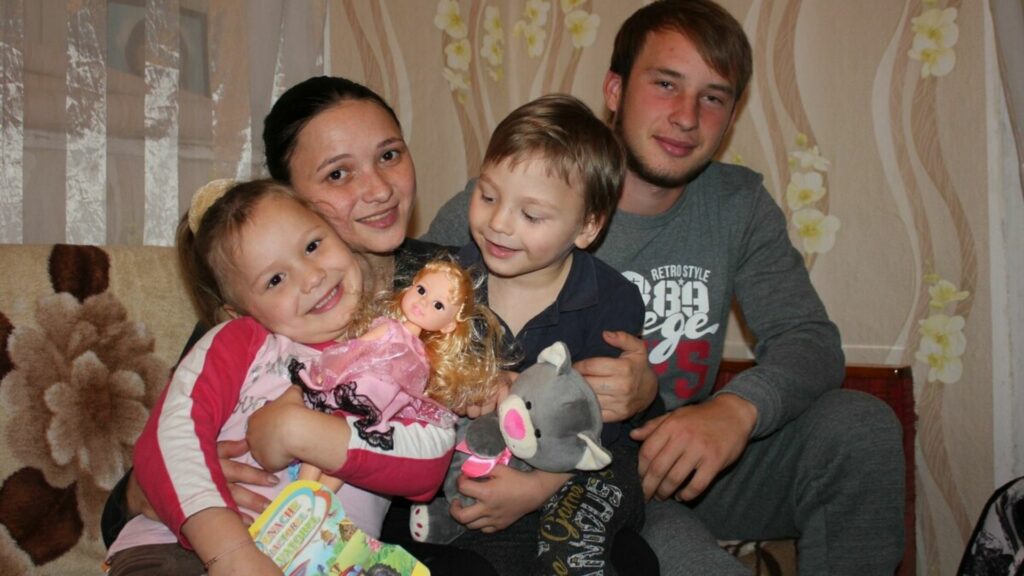
Vasilica* was only four months old and his sister, Ecaterina*, was just one when they were sent to live in the orphanage. Vasilica was born prematurely with cerebral palsy. Poverty and discrimination made it very hard for his mum, Ana*, to care for him alone, without adequate support.
The authorities thought both her children would be better off in an institution. But orphanages don’t protect children, they harm them.
Ana battled for two years to bring her children home again. Through our local partners, CCF Moldova, we made sure she had the practical and emotional support that she needed to succeed. “I saw that Ana loved her children and she fought for them,” says Natalia, the experienced social worker who stood by her, every step of the way.
In the orphanage, Vasilica spent long hours alone in a cot with no one to play with him, encourage him or love him. Today, reunited with his family, he’s a very active, much-loved little boy who likes building tall towers with his wooden blocks and playing chase with his sister.
Creating a new family for Uwera*
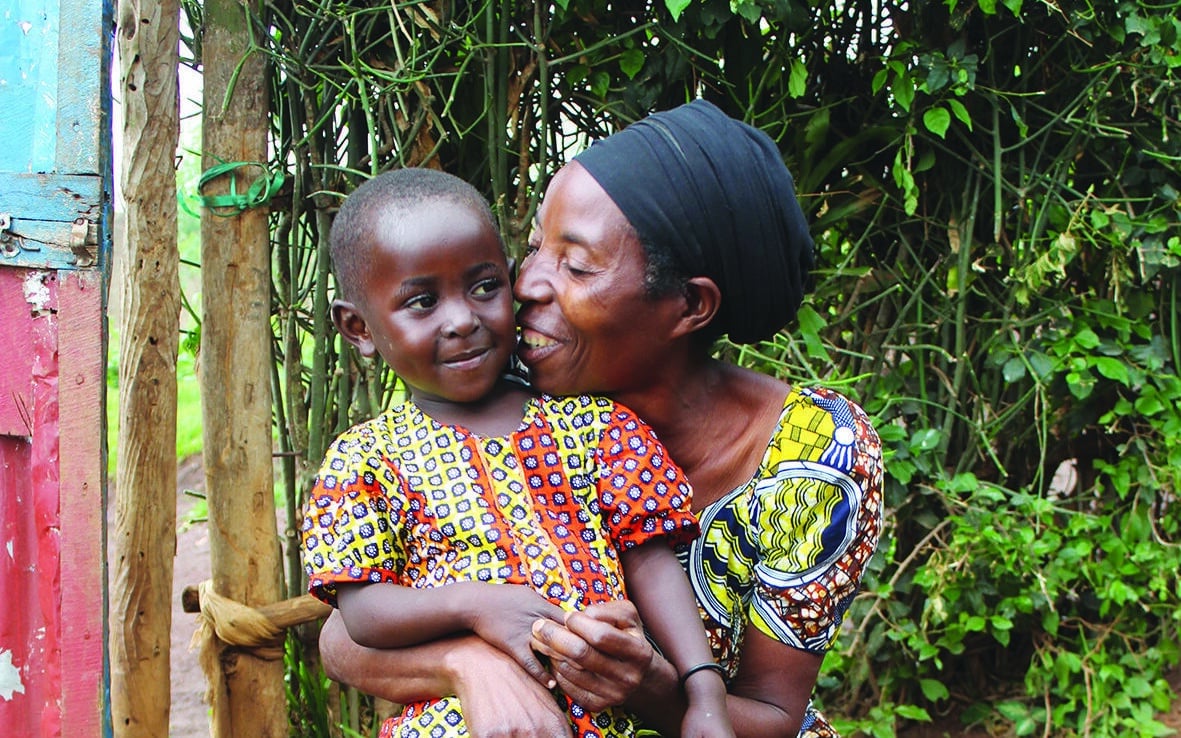
One evening, Atete heard cries from the trees near her yard. There, she found Uwera, a newborn baby girl, abandoned on the ground. Atete scooped Uwera up, took her home and cared for her for three weeks while the community tried to find Uwera’s parents. Once it was clear that no trace could be found, the authorities insisted that Uwera must be taken to an orphanage. Atete was heartbroken. She knew that the last thing an orphanage would provide was the first thing that Uwera needed: someone to love her.
For two years, Uwera struggled in terrible conditions in two different orphanages. She slept on the floor with insects crawling over her and she was fed just once every 24 hours. Shouted at if she made the slightest noise, Uwera stayed silent and struggled simply to survive.
Luckily, following a new commitment by the Rwandan Government to end the use of orphanages, our specialist child protection team in Rwanda was able to work with their local authority partners to close the orphanage and give Uwera back her childhood, reuniting her with Atete.
Uwera has been with her new family for 3 years now. Today, she’s walking and talking, running and jumping. Atete’s older children love to play in their little home. Soon Uwera will begin nursery alongside the other children in her community, and Atete has applied to officially adopt her so that they’ll never be separated again.
Rebuilding their family with love
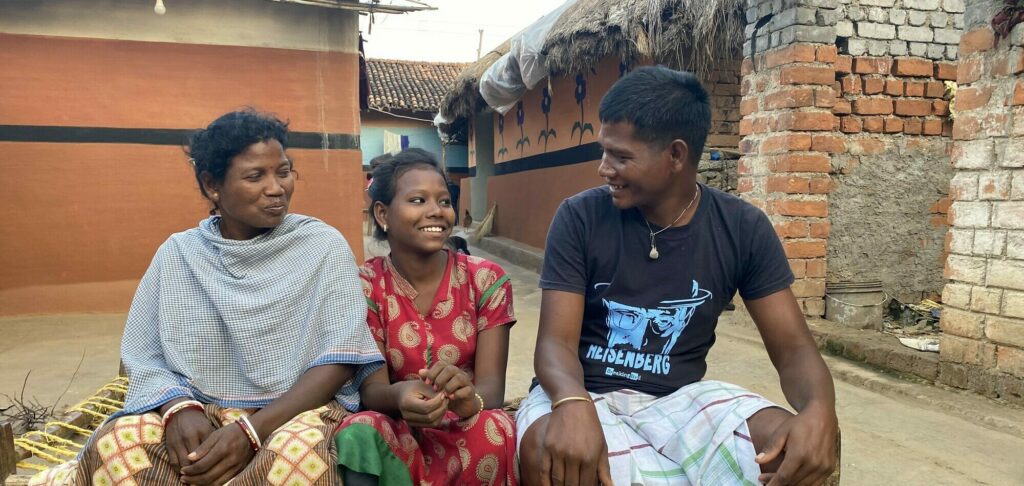
One morning in 2013, Devi was travelling with her mother when their train stopped at a busy railway junction. Without telling her mum, Devi jumped down to fill up her water bottle. While her back was turned, the signal changed and their train pulled out, leaving Devi behind.
For the next seven years, Devi was moved from institution to institution, but no effort was ever made to trace her relatives and reunite her with her family.
In 2015, Devi was sent to live in a shelter for girls in the heart of Ranchi City, the capital of Jharkhand state. This is where she first met Neepa, a social worker with the development NGO, CINI. With support from Hope and Homes for Children, Neepa and her colleagues worked with Devi to recall details about her childhood, contacting local authorities and visiting station after station and asking local people if they knew of a child going missing seven years ago. Until, finally, they found her family again.
When Devi’s father saw her again after seven long years, tears of joy rolled down his face. Sadly, Devi’s mother had never returned but her father now had a new partner and a son. Devi’s oldest sister lived with them too.
The day that Devi officially rejoined her family was very moving for everyone. “Devi cried with emotion as she struggled to find the confidence she needed for the next stage of her extraordinary journey,” Neepa said. “Then she hugged her parents and smiled back at us as she stepped back into a life of love, affection and family care again at last,” she remembers.
How we support families
We keep families together, we reunite families, and we create new families. Family, children and parents are at the heart of everything we do. The three stories shared above show how our global teams work tirelessly to keep families together.
We believe that a child is always better off as part of a strong, supported family. That’s why we’re working to close the doors of orphanages forever so that no child has to be separated from their parents and face the long-lasting harm orphanages cause.
If you would like to donate to our work supporting loving parents and keeping families together, you can do so here. Thank you.
The post 3 incredible stories of love from parents worldwide appeared first on Hope and Homes for Children.
]]>The post “They said how could you possibly want to keep black children?” appeared first on Hope and Homes for Children.
]]>By providing the practical and emotional support their parents needed, Hope and Homes for Children in Bulgaria made it possible for Kaloyan and Maria to be reunited with their family and grow-up where they belong; with the people who love them.
Four year-old twins Kaloyan are very much the centre of attention in the warm and happy home they share with their mum, Tanya, their stepdad Ivan and their older brother and sisters in a village in the North West of Bulgaria.
But the twins spent the first five months of their lives separated from their family in an orphanage after ill-health threatened to tear their family apart. Tanya became pregnant with the twins when she was working abroad to earn money for the family. Ivan agreed to stand by his wife, even though the babies were not his, and Kaloyan and Maria were born soon after Tanya returned home. It was a traumatic birth that ended in an emergency caesarean section and left Tanya suffering from post-natal depression. At the same time, Ivan was admitted to hospital to receive treatment for a heart condition.
Tanya felt completely alone. “I listened to the nurses in the hospital who behaved very badly. They said, “How can you even want to look at your black children? Better you give them up, right?”, she remembers.
Tanya felt completely alone. “I listened to the nurses in the hospital who behaved very badly.”
With no one to support her, Tanya felt she had no choice and made the heart-breaking decision to leave Kaloyan and Maria in an orphanage.
“I cried constantly when I signed to give them up because I grew up without a mother or a father. They left me very young, in a home and I just didn’t want my children to be the way I was.”
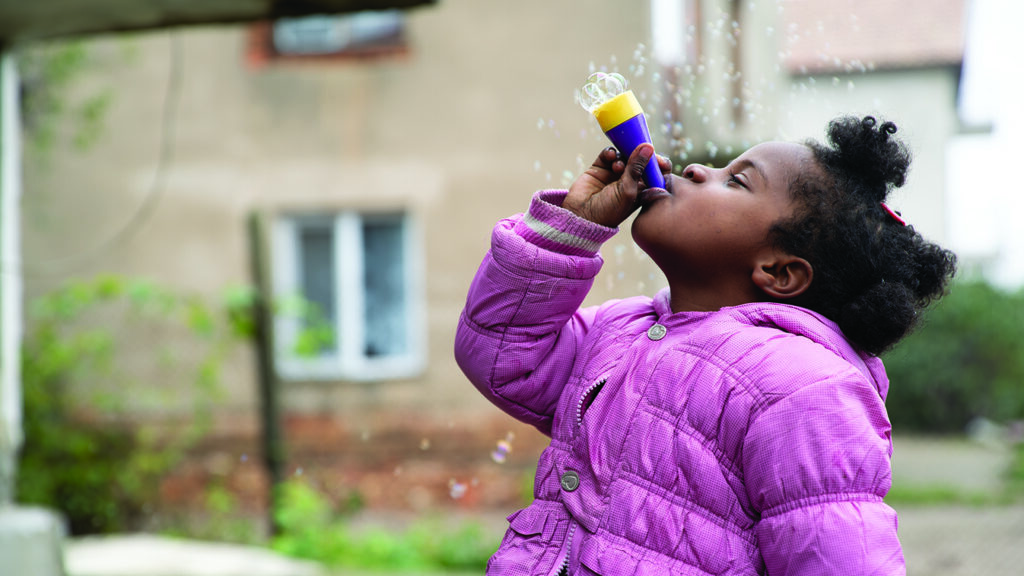
She returned home to Ivan and their older children but could not come to terms with losing the twins.
“I neither ate nor slept peacefully, just wondering how my kids were. How are they in this orphanage without me?”, she explains. Tanya was desperate to find a way to be reunited with her babies. And Ivan decided to support her decision. Even though everyone in their small rural community would know they were not his biological children, even though he was well aware of the prejudice they would face, he was determined to make their family whole again.
“I neither ate nor slept peacefully, just wondering how my kids were. How are they in this orphanage without me?”
It has been tough fight to overcome all the practical, bureaucratic and legal hurdles that have stood in their way—both to bring the twins home and to care for them ever since but our team in Bulgaria has been beside them all the way.
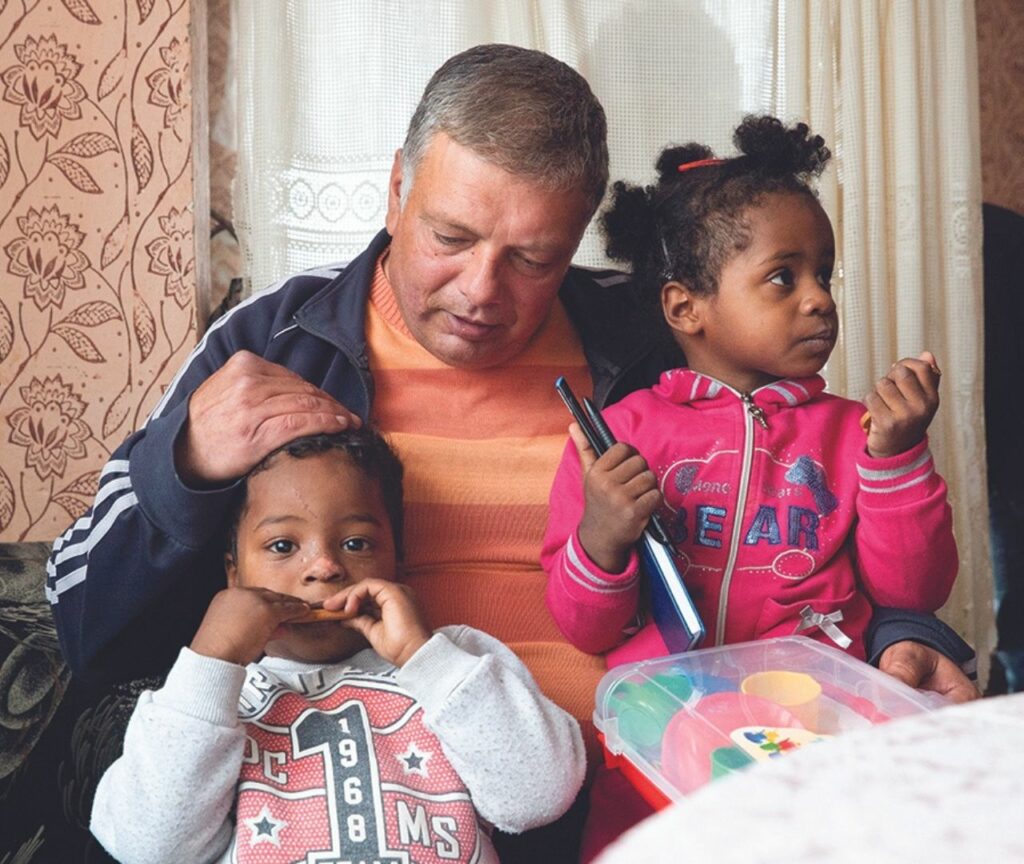
Social worker, Margarita Andreevksa, co-ordinates support for children in families in the area where they live. She ensured that Kaloyan and Maria’s family had all the practical and emotional support they needed to bring the twins home and be able to care for them for good. This included paying for transport for Tanya and Ivan to visit the twins in the institution and rebuild their bond with their babies; help with red tape to receive the extra social support the family is eligible to claim for the children; arranging and attending specialist appointments with Tanya to help her recover fully from the birth of the twins and protect herself from future unwanted pregnancy; securing the medicines that Ivan needs to manage his heart condition; and providing food, baby essentials, fuel for heating and extra clothes for all the children in the immediate months after the twins returned from the orphanage.
“Social worker, Margarita Andreevksa, co-ordinates support for children in families in the area where they live. She ensured that Kaloyan and Maria’s family had all the practical and emotional support they needed to bring the twins home and be able to care for them for good.”
Five months after they were born, Maria Andreevska went with Tanya to bring the twins home from the orphanage and in the months that followed she helped to arrange and attended their medical appointments to make sure they have treatment when needed and all the vaccines they need to enroll at nursery. Today Kalyon and Maria are four years old and they are happy, sociable and energetic children. Like all children their age, they love their toys but especially picture books that make sounds. Because of his health issues, Ivan does most of the childcare while Tanya works as a street cleaner. They both take seasonal work like picking walnuts where they can. “Everything was just wall after wall, after wall, after wall,” Ivan says, “But here we are and we are still one.”
Support our work Every child deserves a family
Help us to make sure that every child has a loving, stable home.
The post “They said how could you possibly want to keep black children?” appeared first on Hope and Homes for Children.
]]>The post “I saw that Ana loved her children and she fought for them.” appeared first on Hope and Homes for Children.
]]>The authorities thought both her children would be better off in an institution. But orphanages do not protect children, they harm them.
Consigning children to one-size-fits-all institutions, puts them at high risk of neglect and abuse and threatens their fundamental development. This is especially true for children as young as Vasilica and Ecaterina. To feel safe and happy, to grow, learn and really thrive, all children need to know that they are loved, and they belong; they need families.
Ana battled for two years to bring her children home again. Through our local partners, CCF Moldova, we made sure she had the practical and emotional support that she needed to succeed. “I saw that Ana loved her children and she fought for them,” says Natalia, the experienced social worker who stood by her, every step of the way.
In the orphanage, Vasilica spent long hours alone in a cot with no one to play with him, encourage him or love him. Today, reunited with his family, he’s a very active, much-loved little boy who likes building tall towers with his wooden blocks and playing chase with his sister.
Natalia is continuing to make sure that Ana has the specialist support and advice she needs to continue to care for Vasilica at home. Their next goal together is to make sure that he can attend nursery and then school, so that he can continue to learn and develop, alongside his sister and the other children in his community.
Support our work Help bring children home
With your support, we can reunite families torn apart by orphanages
The post “I saw that Ana loved her children and she fought for them.” appeared first on Hope and Homes for Children.
]]>The post Bringing Mihai back home to the people who love him appeared first on Hope and Homes for Children.
]]>When Mihai was eight years old, he was shut in a small room by himself for three weeks with no toys, no books and no one to talk to. Staff in white coats and plastic gloves watched him through a large internal window and passed him food three times a day. This was the Isolation Unit in the orphanage in Moldova where Mihai had been sent because his family had nowhere to live. His mum, Valentina, was struggling to care for Mihai and his new-born baby sister, Amelia, on her own.
The authorities gave Valentina and Amelia a place in a Mother and Baby Unit and sent Mihai to the orphanage. They believed he’d be safer there. But orphanages do not protect children; they harm them, denying children the love and individual care that’s so vital to their development, their happiness and their well-being.
“The children were sad there. All of them were somehow afraid of their carers.”
For example, every new child that enters the orphanage where Mihai was sent, even babies and toddlers, spend 21 days alone in the Isolation Unit to make sure they’re not carrying any infections. It’s hard to imagine what a traumatic experience this must have been for Mihai, so soon after being separated from his mum and his sister. When this ordeal was finally over, Mihai spent a further six months in the main orphanage, with no one to love or protect him. “The children were sad there,” he told us. “All of them were somehow afraid of their carers.”
“Who will love Mihai if not me?”
Valentina is a loving and courageous mother who knew from bitter experience what her son would be going through. She spent her own childhood, confined to a loveless institution, after both her parents died in a car crash. “Who will love Mihai if not me?” she asked us in despair.
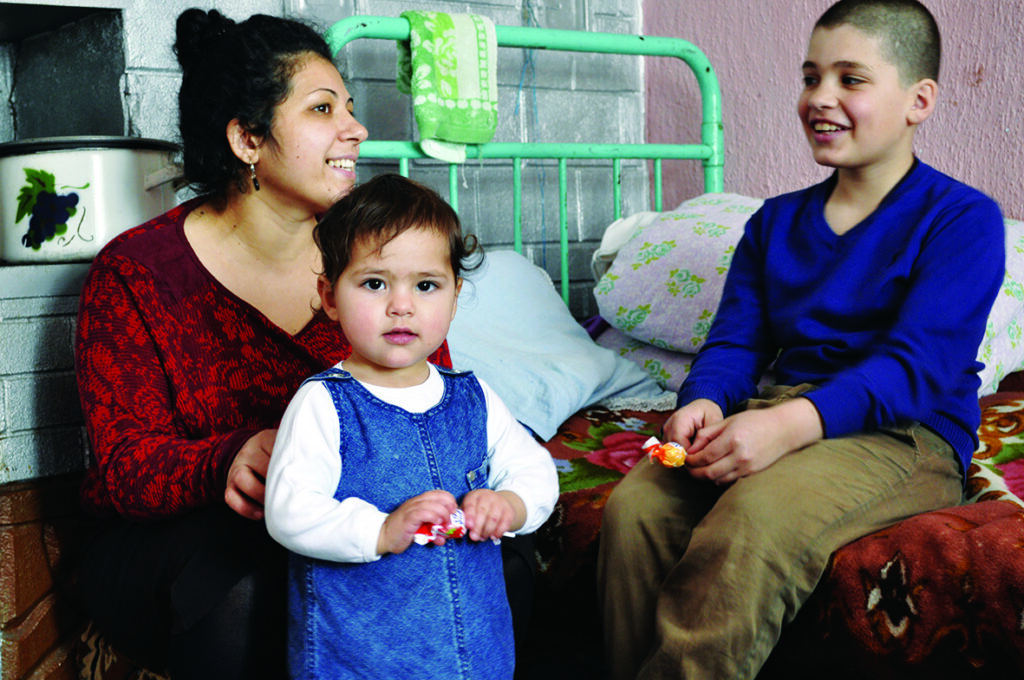
That’s when our partner CCF Moldova stepped in. A local team of skilled and dedicated professionals, they worked with the local child protection authorities to reunite Mihai with his family. Their specialist social workers made sure the family had a safe, permanent place to live and gave Valentina all the practical and emotional support she needed to continue to care for her children herself.
Now Mihai is overjoyed to be home again and growing-up with the people who love him, in the place where he belongs.
Support our work We need your help
Your donation will help us reunite families like Mihai's.
The post Bringing Mihai back home to the people who love him appeared first on Hope and Homes for Children.
]]>The post “Nobody cares for me here” appeared first on Hope and Homes for Children.
]]>Cary’s mum, Patricia, was young and alone when Cary was born. Although Patricia’s parents helped to care for Cary when she was small, with no access to specialist family support, they found it impossible to meet their granddaughter’s additional needs alone.
When Cary was just five years old, her family heard about an orphanage for children with disabilities in another part of Rwanda. They made the heartbreaking decision to admit Cary to the institution, knowing it was too far to visit but hoping Cary would receive the extra support she needed there. Instead, she spent the next nine years, neglected and alone, with only a handful of untrained staff to care for her and all the other children with complex needs who lived there.
At first, Cary was allowed to go to the local school. She is very curious and loves to learn but when the teachers realised that, even as she grew older, she would still need assistance to visit the toilet, they told her she could no longer attend.
“No one cares for me here,” Cary confided when our specialist team in Rwanda began work to close the orphanage. She was so desperate to leave, she even went on hunger strike. “I want to be at home and be part of a family,” she demanded.
Finding Cary’s family
Our team’s first priority was to make contact with Cary’s family and see if, with the right support, they would be able to welcome her home again.
They managed to trace Cary’s mum, Patricia, and established that her life today is far more secure than before. Patricia is married now, with three children. She has also trained as a tailor so that she can earn money to support her family.
Taking time and great care, our skilled social workers and psychiatrists, helped Cary and her family prepare for the life-changing day when she could return home. This included connecting Cary with the local health centre to make sure she receives the medicines she needs on daily basis, and also installing an accessible toilet in their home.
Home at last
In March 2019, Cary’s wish came true at last when she was reunited with her family. With her mum and stepdad and her brother and sisters to love and protect her, our team in Rwanda confirm that Cary is much happier now.
“Back in the orphanage, I used to cry so often, if I can describe it in one word it was sadness. But now, even though I can get into fights with my siblings, I am happy and content. Home is a good place where children get support from their parents. In my case I get support from my mother, and I learn family values.”
Cary, now safe at home with her family
Her siblings are happy too. “We knew we had a sister, but we didn’t know who she was. Now we know her!”, Cary’s brother told them.
“There is a massive change when you compare Cary today and when she was in the institution”, explains Child Psychologist, Richard Munyaneza, a member of our social work team in Rwanda. “Back in the institution, even when she smiled you would see a deep sorrow and she was always asking for her mother to come and take her home. Now she looks much happier. She used to express a lot of anger but now she shares joy via jokes and humour. She has already formed a strong bond with her younger siblings but especially with her mother. Simply, she is happier than before.”
We will continue to monitor Cary’s progress, to make sure that she stays safe, happy and well. And our next priority is to secure a place for Cary in her local school, to ensure that she can continue to flourish and learn, alongside all the other children in her community.
Support our work Help end orphanages for good.
Help children like Cary stay at home with families who love them
The post “Nobody cares for me here” appeared first on Hope and Homes for Children.
]]>The post Finding family: Devi’s extraordinary Story appeared first on Hope and Homes for Children.
]]>One fine morning in 2013, Devi was traveling with her mother when their train stopped at a busy railway junction. Without telling her mum, Devi jumped down to fill up her water bottle, while her back was turned, the signal changed and their train pulled out, leaving Devi behind. That moment is still etched on her memory.
“I was very scared and worried when I saw the train start to move. I shouted and ran to get on, but I couldn’t. I was crying and left with no choices. I felt lost in this world,” Devi remembers vividly.
With no idea what to do, Devi climbed on board the next departing train, little knowing it was headed in completely the wrong direction. Frightened and bewildered she approached a family with small children. At the next stop, they took Devi to the station master, who handed her over to the child protection authorities.
That was the moment Devi really got lost for good; in India’s vast orphanage system.
For the next seven years, Devi was moved from institution to institution, but no effort was ever made to trace her relatives and reunite her with her family. She was just one more child among so many, struggling to survive with no sense of who she was or where she belonged.
In 2015, Devi was sent to live in a shelter for girls in the heart of Ranchi city, the capital of Jharkhand state. This is where she first met Neepa, a social worker with the development NGO, CINI. With support from Hope and Homes for Children, Neepa and her colleagues are working to transform this institution into a short-term emergency care centre by finding long-term safe and loving family-based care for all the children currently living there.
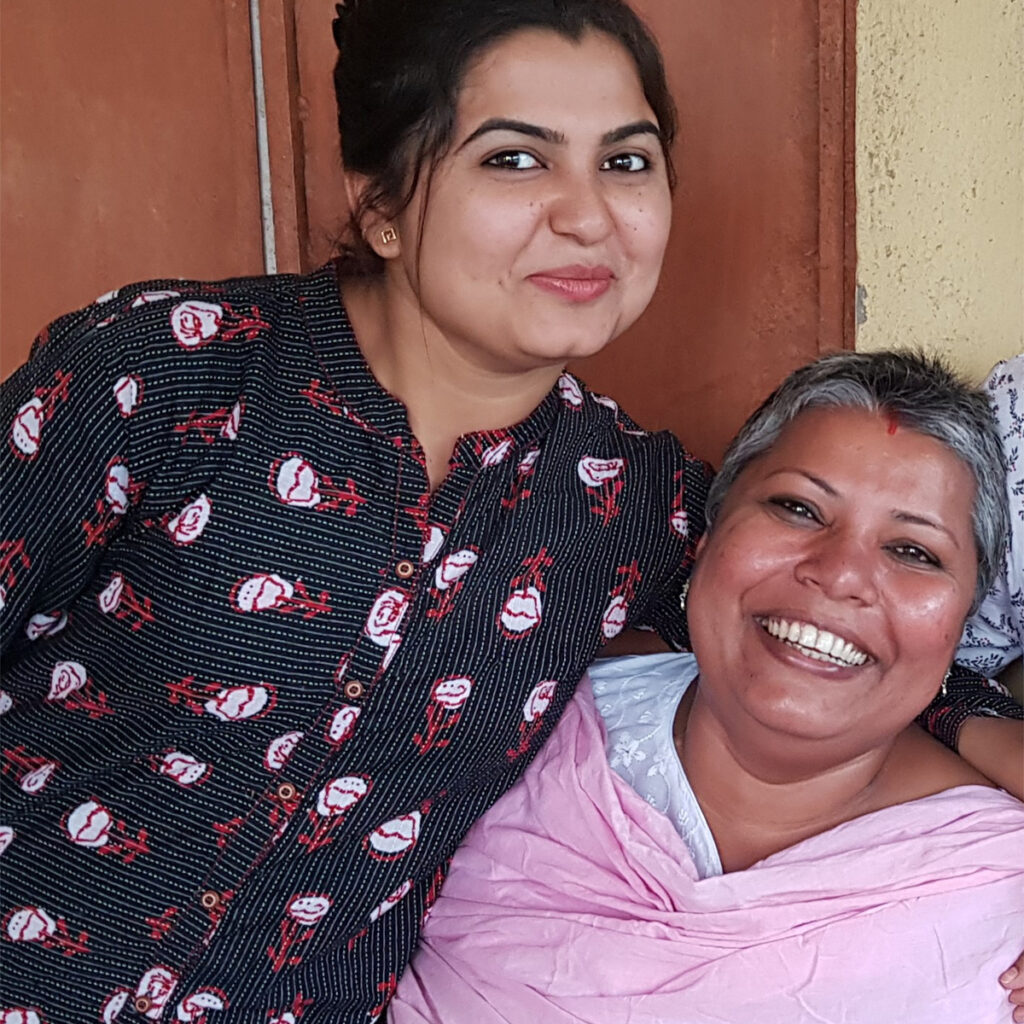
“Devi was a very shy and anxious girl but she had somehow kept the light of hope alive and she let me know how desperate she was to get back to her mum.”
Neepa, social worker with our partners in India CINI
But seven years had passed since Devi had jumped down from that train. She was 14 years old and could remember very little about her past. “She could hardly remember her mother’s face”, Neepa recalls.
“Undaunted, they decided to retrace Devi’s journey with her, visiting station after station and asking local people if they knew of a child going missing seven years ago.”
With care and patience, Neepa encouraged Devi to tell her all she could remember and managed to piece together a picture of the last place she had lived. Devi’s parents had separated and Devi and her mum had been staying with her auntie, near a large railway junction on the line between Howrah and Mumbai.
“Devi told me their home was by a single track with houses of different sizes on both sides. But this was the only real clue we had to work with”, Neepa explains.
Neepa and her team checked with the local police and with the school authorities, but no record of Devi or her family could be found. Undaunted, they decided to retrace Devi’s journey with her, visiting station after station and asking local people if they knew of a child going missing seven years ago. But nothing clicked.
“It was nearly dark and we had almost given up hope when something about the place where we were standing struck me”
Neepa remembers, “Here there were similarities to the place that Devi had described, less crowded than the other stations, with mixed houses on either side of a single railway track. We walked on a few meters to speak with the local people and ask them if they remembered anything about Devi. Did anyone here recognise her picture?”
On one corner, a couple were making coal balls to sell for fuel. When Neepa showed them Devi’s childhood photo, the woman recognised her immediately! “She knew this child had gone missing and said she knew her relatives. It was an amazing moment for all of us and kept the ray of hope alive. That woman showed us the way to her village and introduced us to the people she believed were Devi’s family.”
“When Devi’s father saw her again after seven long years, tears of joy rolled down his face”
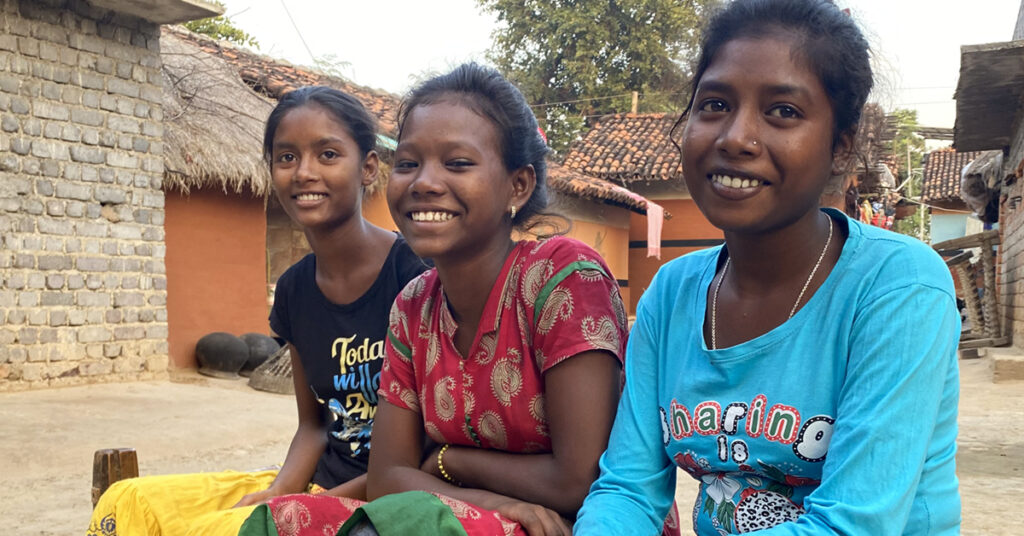
When Devi’s father saw her again after seven long years, tears of joy rolled down his face. Sadly, Devi’s mother had never returned but her father now had a new partner and a son. Devi’s oldest sister lived with them too. Neepa and her colleague, Rini, spent a long time talking to the family to try to see whether they would be able to welcome Devi back into their home.
“I’m really happy to be back home instead of in the orphanage because now I have love and a family to care for me”
The day that Devi officially rejoined her family was very moving for everyone. “Devi cried with emotion as she struggled to find the confidence she needed for the next stage of her extraordinary journey,” Neepa confirms. “Then she hugged her parents and smiled back at us as she stepped back into a life of love, affection and family care again at last,” she remembers.
Today, Devi is settling well into family life. She is enrolled in school and enjoying her studies. “I’m really happy to be back home instead of in the orphanage because now I have love and a family to care for me,” she told us recently. “I am free to go to different places, to markets or wedding celebrations. I am even learning our local language so I would say family is the best place for me.”
The post Finding family: Devi’s extraordinary Story appeared first on Hope and Homes for Children.
]]>The post “We cried the whole night until dawn broke” appeared first on Hope and Homes for Children.
]]>Maya was four years old when her parents made a difficult decision to admit her to Asha Orphanage in Chitwan District. “There was no good school in our village,” Buddhi explains. “Nani (daughter) did not want to go. We cried the whole night until dawn broke and it was time for her to go. We did not want her to but the situation was very difficult for us.”
For seven long years Buddhi Maya had not seen her daughter, Maya, while she was in the orphanage. “Every night when I tucked my three daughters to sleep, I missed Maya and imagined her sleeping peacefully next to her sisters but the emptiness always made me cry.”
In June 2021, Maya was removed from the orphanage with the collective help of the local, central authorities and our organisation and was reunited with her family.
Buddhi, Maya’s mother remembers: “When Maya came home after such a long time, I did not know much about my own daughter. Sending my daughter away had made us strangers.” With the help of our education and family support, today Maya is with her mother and sisters, which she had dreamed of for so long.
Buddhi Maya said to Bina, our Reintegration Officer: “The support your organisation lit a sense of hope inside me that I can provide for my daughters no matter what struggles may arise.”
From learning her ethnic language to sharing things as sisters, each day has been a learning experience for Maya.
Buddhi Maya is now providing for her four daughters
Today, their house is a happy place due to the loving bond between mother and her four daughters. Maya and her sisters are working hard in their studies and do the household work while their mother is in work. Buddhi Maya knows that what she earns is a minimum wage but she is willing to struggle endlessly to provide for her daughters.
Her daughters understand the hardships their mother has been facing to provide for the family. “When you have daughters, they will have many necessities,” Buddhi Maya explains. “I have not been able to provide many necessary things but they understand when I say we will buy it next time.”
Apart from her daily earnings, Buddhi Maya also looks after the tomato farm she cultivated in a leased land as a part of our income generation support.
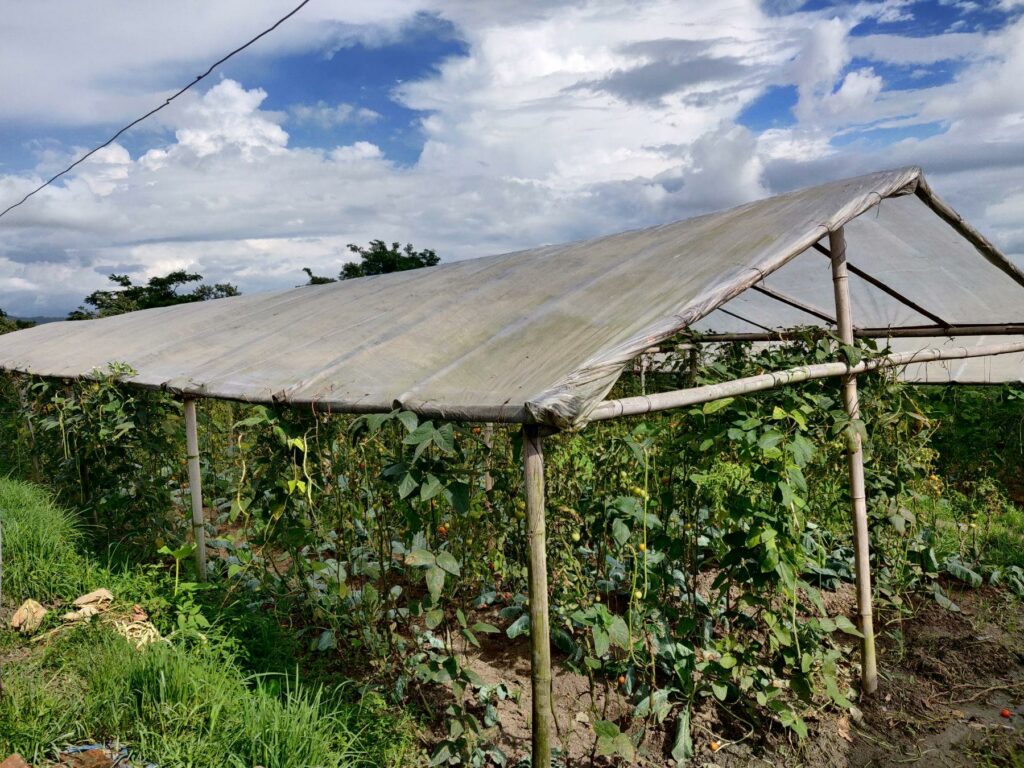
Continuing schooling during the pandemic
Maya is currently studying in Grade 8. She has become more open and expressive about how she feels and what she aspires to be due to our regular follow-ups and support. Due to the pandemic, Maya and her sisters’ education is also affected. They cannot afford four separate mobile phones to continue online classes but they are managing from one mobile phone gifted by Maya’s paternal uncle.
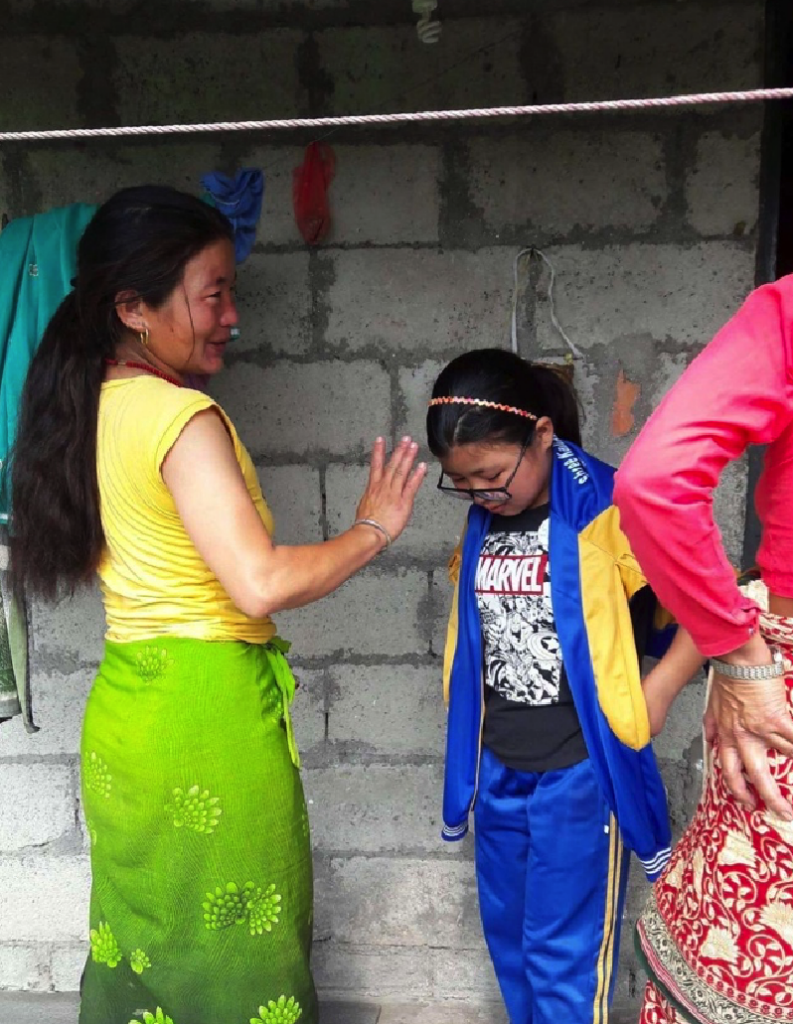
Buddhi Maya’s new-found courage
“Everyone makes mistakes,” Buddhi Maya says. ”My husband also made a mistake but he did not return even after our daughters pleaded with him in phone calls and messages. Now, my daughters tell me – you are both our father and mother and this has added so much courage inside me.”
Her face lights up when she talks about Reintegration Officers Bina and Tenzin. “This office is like my family,” she explains. ”I know you cannot support us with everything. I will do all I can. Care is not just about giving money. The support I have received from you all always makes my heart happy and gives me courage. I pray your office helps other needy families as well. Dhanyabaad!”
The post “We cried the whole night until dawn broke” appeared first on Hope and Homes for Children.
]]>The post “My soul was torn apart” – Lana’s story appeared first on Hope and Homes for Children.
]]>The hardest time in my life, something that I never imagined would happen to me, was when I had to leave her in the orphanage because I had nowhere else to go. I didn’t have the support of my family. They simply said, “she has no place here.” My partner, he also made it clear that he was not interested. I was on my own.
The fight began as soon as I went to the hospital to give birth. They said, “your baby will go to the orphanage”. I will never forget those words. It is by official procedure only. These are people who have probably been doing this all their lives and they have no emotions. They tell you that you must make a statement, saying that you give up your baby. Everything’s screaming at you, you don’t want to do it, but what can you do? They didn’t bring me Minela because of that statement. They said it was in her best interests.
Everything’s screaming at you, you don’t want to do it, but what can you do?
After two days, I left the hospital. You come home as you are and it’s just like nothing happened. That was the worst moment. My family didn’t even ask me what gender my baby was. They told me to act as if nothing had happened, to put her up for adoption and get on with my life. I just couldn’t do it. We’re talking about a baby; we’re talking about a living human being. She didn’t deserve it, this child didn’t deserve it. That’s when I straightened up. That was when I came to terms with it, and I said, “Okay, you write your story now, you write your story with your child.”
I went to the social services department the day after my baby was born and then I went every other day after that until they got sick of me. I could tell they weren’t really listening to me. They looked right through me. The State tells you that to keep your baby you must have a place to live, a job but they don’t help you do this. Days go by, you’re simply choking. It can be like that for the next 100 years, as far as they are concerned.
Even to get permission to see her in the orphanage was a battle. At first, they would only give me a pass for one short visit a week. I could see their plan. They thought I would forget about her and go away and then they could put her up for adoption. She’s a healthy baby girl. They had it all worked out. Those institutions, I can’t understand how anyone ever thinks that this is the way to help children.
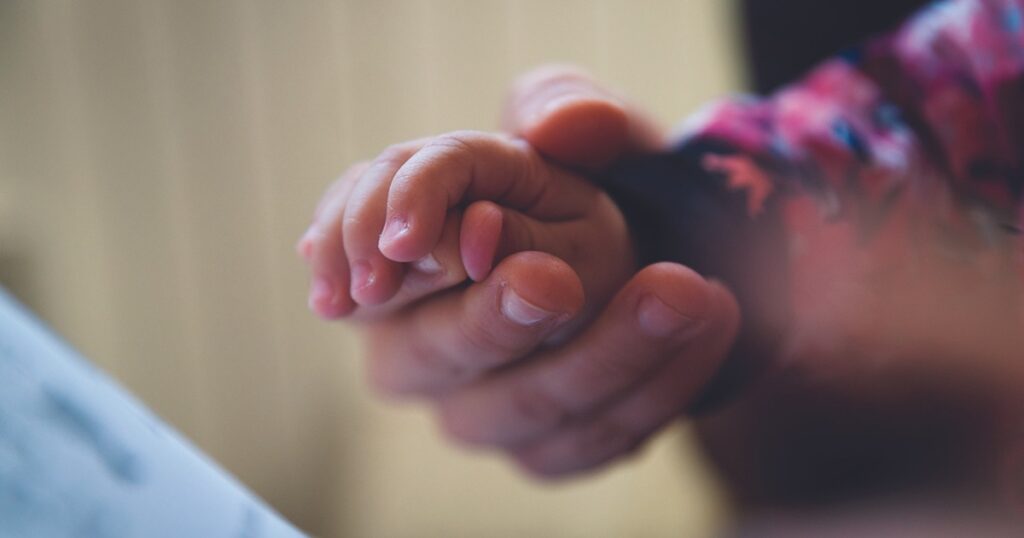
My soul was torn apart.
I used to go to see Minela in the orphanage, but I could never tell my family because they didn’t accept her. They just didn’t care. I used to feel like I wanted to go up to the mountain outside the city just to scream, just to get out of myself. Hope and Homes for Children were the only ones who helped me. I met two of their social workers, Mirjana and Adnan and they said “We can see the frustration that is boiling inside you. Sit down with us, take a deep breath, tell us everything and we will try to help”. They were the only ones who listened to me. I can’t tell you how that felt. They said, “We’ll help you find work and a nursery place for you baby.” They really are my favourite.
“We can see the frustration that is boiling inside you. Sit down with us, take a deep breath, tell us everything and we will try to help”.
Mirjana is a psychologist and she really helped me to cope with my emotions. I found work as a care assistant for an elderly lady and I earn enough to pay rent on a small flat and to cover my expenses. Hope and Homes for Children found a nursery place for Minela, even though the waiting lists are really long.
“Enrolled in day care”.
On a form, it’s just one line. It looks like nothing. No one sees the work behind that. The time, the phone calls. And it was Hope and Homes for Children who did that for me.
I brought Minela home from the orphanage on her first birthday. Honestly, it took so long to get permission and I simply had to set myself a limit and with the help of Hope and Homes for Children, this is happened. There was nothing better for me when a social worker from the local authority called me and said, “You got your permission, come for the paper and take the baby.” I literally went straight there. Simply, I had to. She’s more important to me. Nothing better happened in life.
Hope and Homes for Children help me pay for Minela to go to nursery when I am working. They also help me with food and other essentials. Because Minela was already a year old when she came home, it took time for her to adapt. In the orphanage, there were so many carers and children, it’s noisy and then all of a sudden, she’s left alone with me. We needed some time to establish our connection.
Minela is part of me and I don’t want her to grow up in the orphanage. I don’t want to wage any more wars. It was hard, but now it’ll be good. It’ll be better.
Support our work Help keep children out of orphanages
You can help us provide the financial, practical and emotional support families need to stay together. With the basics taken care of, mothers like Lana won’t have to surrender their children to orphanages.
The post “My soul was torn apart” – Lana’s story appeared first on Hope and Homes for Children.
]]>The post A day in my life: Elizabeth Niyongana, Family Tracer appeared first on Hope and Homes for Children.
]]>Dadu’s story
Dadu was seven years old when we first met and he had spent his whole life alone in the orphanage. He has difficulty speaking and he finds it hard to co-ordinate his movements so he uses a wheelchair. Dadu attends school regularly and understands his lessons, but in the classroom he stays very quiet. Every time I saw him, he would ask me “Mama? Papa?” and this would make me very sad. Looking through the orphanage records, I discovered that Dadu had been brought to the institution by his mum soon after he was born because she could see no way to raise him on her own. His mum did not live far away and so I made contact and began to visit. Sadly though, despite many meetings where I explained how we could support her to care for Dadu and help him to learn and develop, I could not persuade her to visit her son or even think about bringing him home again. That is when I began to look for Dadu’s birth father.
The search for Dadu’s father
Luckily, a lady who had seen me meeting with his mum approached me, and told me she knew his dad’s name and where he came from. Together with my colleagues in the reintegration team, I travelled to that area and, with help from the local authority, we set up a meeting with Dadu’s dad and his wider family. We sat together outside their home and we told them all about Dadu and why it was so important for him to live in the love of a family, and to not be left alone in an institution. After a long silence and deep reflection, Dadu’s dad acknowledged that our story was true and that Dadu was indeed his child. At that moment, I felt an inner peace, relieved and very happy. I thanked Dadu’s dad for his honesty.
Dadu’s grandmother, a very old woman, cried a lot. She went in a room and came back with her savings, saying “Please take this money to my grandson and tell him that he has a grandmother who wishes to meet him before she dies.” A few days later, Dadu’s dad came to visit him in the orphanage. When he saw his son, tears of joy appeared on his face. The following week, we took Dadu to visit his dad’s family. We talked to him about leaving the orphanage to live with his dad and what this would mean. Once we were sure he understood, we asked Dadu if he wanted to go to live with is dad. His answer was clear: “Papa, papa, papa!” he shouted. It took time to make sure Dadu and his family were completely ready to be reunited. This included improving their living conditions and showing the family how to care for Dadu safely at home.
She went in a room and came back with her savings, saying “Please take this money to my grandson and tell him that he has a grandmother who wishes to meet him before she dies.”
Bringing Dadu home
Finally, in October 2020, Dadu left the orphanage for good, to live with his dad and his extended family. It was such a joyful event. During the welcome ceremony, Dadu’s grandmother looked at him and said, “I saved the lives of children who sought refuge in my house during the genocide, and now the Lord has opened my eyes and given me the chance to meet my grandson.” As one of the team who monitors Dadu’s progress now, I am proud to see how his stepmother is taking care of him, carrying him on her back despite his age and taking her time to cuddle him. I feel speechless but filled with gratitude to God who gave me this job that restores joy in the hardest situations.
This article originally featured in the Winter 2020 edition of our supporter magazine, Hope.
Support our work Help reunite families
Support the work of Elizabeth and our other dedicated staff around the world, as they reunite children from orphanages with their families.
The post A day in my life: Elizabeth Niyongana, Family Tracer appeared first on Hope and Homes for Children.
]]>